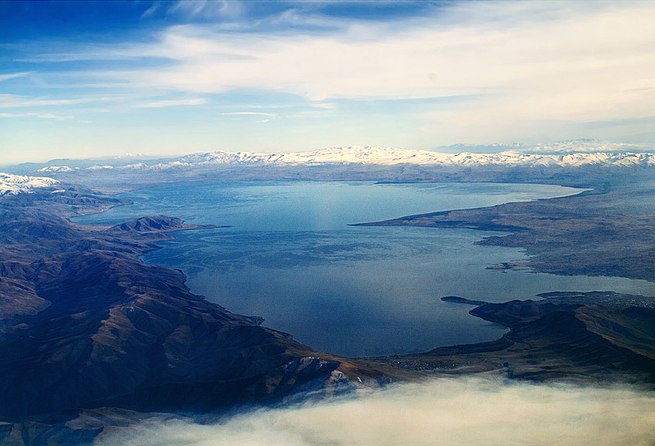
Main Difference
The main difference between Lake and Pond is that the Lake is a body of relatively still water, localized in a basin and Pond is a body of standing water, either natural or man-made, that is usually smaller than a lake.
-
Lake
A lake is an area filled with water, localized in a basin, that is surrounded by land, apart from any river or other outlet that serves to feed or drain the lake. Lakes lie on land and are not part of the ocean, and therefore are distinct from lagoons, and are also larger and deeper than ponds, though there are no official or scientific definitions. Lakes can be contrasted with rivers or streams, which are usually flowing. Most lakes are fed and drained by rivers and streams.
Natural lakes are generally found in mountainous areas, rift zones, and areas with ongoing glaciation. Other lakes are found in endorheic basins or along the courses of mature rivers. In some parts of the world there are many lakes because of chaotic drainage patterns left over from the last Ice Age. All lakes are temporary over geologic time scales, as they will slowly fill in with sediments or spill out of the basin containing them.
Many lakes are artificial and are constructed for industrial or agricultural use, for hydro-electric power generation or domestic water supply, or for aesthetic, recreational purposes, or other activities.
-
Pond
A pond is a body of standing water, either natural or artificial, that is usually smaller than a lake. They may arise naturally in floodplains as part of a river system, or they may be somewhat isolated depressions (examples include vernal pools and prairie potholes). They might contain shallow water with marsh and aquatic plants and animals. The type of life in a pond is generally determined by a combination of factors including water level regime (particularly depth and duration of flooding) and nutrient levels, but other factors may also be important, including presence or absence of shading by trees, presence or absence of streams, effects of grazing animals, and salinity.
Ponds are frequently human-constructed. In the countryside farmers and villagers dig a pond in their backyard or increase the depth of an existing pond by removing layers of mud during summer season. A wide variety of artificial bodies of water are classified as ponds. Some ponds are created specifically for habitat restoration, including water treatment. Others, like water gardens, water features and koi ponds are designed for aesthetic ornamentation as landscape or architectural features. Fish ponds are designed for commercial fish breeding, and solar ponds designed to store thermal energy. Treatment ponds are used to treat wastewater.
Standing bodies of water such as puddles, ponds, and lakes are often categorized separately from flowing water courses, such as brooks, creeks, streams or rivers. Nutrient levels and water quality in ponds can be controlled through natural process such as algal growth, or through artificial filtration, such as an algae scrubber.
-
Lake (noun)
A small stream of running water; a channel for water; a drain.
-
Lake (noun)
A large, landlocked stretch of water.
-
Lake (noun)
A large amount of liquid; as, a wine lake.
-
Lake (noun)
A pit, or ditch
-
Lake (noun)
An offering, sacrifice, gift.
-
Lake (noun)
Play; sport; game; fun; glee.
-
Lake (noun)
A kind of fine, white linen.
-
Lake (noun)
In dyeing and painting, an often fugitive crimson or vermillion pigment derived from an organic colorant (cochineal or madder, for example) and an inorganic, generally metallic mordant.
-
Lake (verb)
To present an offering.
-
Lake (verb)
To leap, jump, exert oneself, play.
-
Lake (verb)
To make lake-red.
-
Pond (noun)
An inland body of standing water, either natural or man-made, that is smaller than a lake.
-
Pond (noun)
An inland body of standing water of any size that is fed by springs rather than by a river.
-
Pond (noun)
The Atlantic Ocean. Especially in across the pond.
“I wonder how they do this on the other side of the pond.”
“I haven’t been back home across the pond in twenty years.”
-
Pond (verb)
To block the flow of water so that it can escape only through evaporation or seepage; to dam.
-
Pond (verb)
To make into a pond; to collect, as water, in a pond by damming.
-
Pond (verb)
To form a pond; to pool.
-
Pond (verb)
To ponder.
-
Lake (noun)
a large area of water surrounded by land
“Lake Victoria”
“boys were swimming in the lake”
-
Lake (noun)
the Lake District.
-
Lake (noun)
a pool of liquid
“the fish was served in a lake of spicy sauce”
-
Lake (noun)
a large surplus of a liquid commodity
“the EU wine lake”
-
Lake (noun)
an insoluble pigment made by combining a soluble organic dye and an insoluble mordant.
-
Lake (noun)
a purplish-red pigment made in the same way as lake, originally one obtained from lac.
